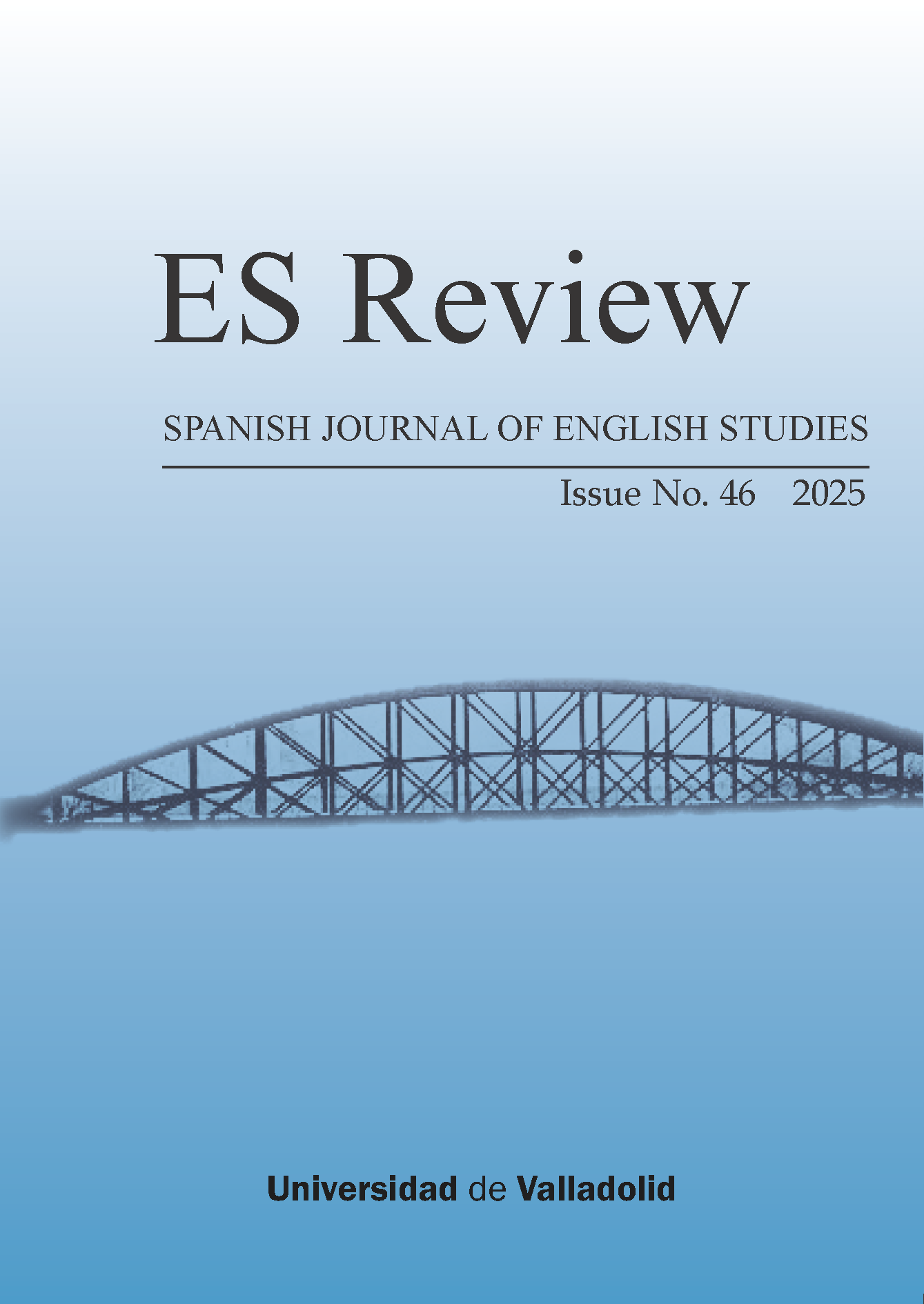Luto por la nación perdida: La poética transformadora de Derek Jarma The Last of England y Terence Davies Of Time and The City.
DOI:
https://doi.org/10.24197/0n1bee98Palabras clave:
Nostalgia, Cine, Política, Poesía, Inglaterra, Identidad NacionalResumen
El duelo por la decadencia de la gloria de Inglaterra se ha convertido en una presencia constante en la cultura inglesa posmoderna. Hay un sentimiento siempre presente de nostalgia por la disolución del pasado, mientras, simultáneamente, se cancela el futuro. Tanto Derek Jarman como Terence Davies transformaron las películas en dispositivos poéticos donde la emoción debía ser vertida, reflexionada y revitalizada. Este artículo pretende estudiar cómo se articulan las poéticas de los autores, con el objetivo de analizar las intersecciones entre poesía, cine, política e identidad nacional. Para ello, se interpretarán los recursos y estrategias poéticas en relación con la situación política, ya que ambos autores establecen conexiones entre las emociones individuales a nivel micro-personal y el panorama político y colectivo más amplio. Jarman y Davies supieron elaborar una epistemología nostálgica a partir de una poética que les permitió reconocer el actual estado de desolación, pero también construir una nueva identidad para la nación.
Descargas
Referencias
Álvarez, Iván Villarmea. “Urban Self-Portraits and Places of Memory: The Case of Terence Davies’ Of Time and The City.” Cityscapes: World Cities and Their Cultural Industries, Common Ground Publishing, 2014, pp. 40–53.
Balboni, Francesca. "Burning Through: Derek Jarman’s Realism in The Last of England (1987)." Oxford Art Journal, vol. 42, no. 2, 2019, pp. 217–31, doi: 10.1093/oxartj/kcz003.
Bifo-Berardi, Franco. After the Future. AK Press, 2011.
Belgley, Jon. “The Literature of the Falklands/Malvinas War.” Edinburgh Companion to Twentieth-Century British and American War Literature, edited by Adam Piette and Mark Rawlinson, Edinburgh University Press, 2012, pp. 231–40.
Brydon, Lavinia. “The Nostalgic Gardens of Derek Jarman’s England.” Dandelion: Postgraduate Arts Journal and Research Network, vol. 4, no. 2, 2013, pp. 1–15, doi: 10.16995/ddl.288.
Conan Doyle, Arthur. The Sign of the Four. Oxford UP, 2014.
Davies, Terence. Of Time and The City. Hurricane Films, 2008.
Dillon, Steven. Derek Jarman and Lyric Film: The Mirror and the Sea. University of Texas Press, 2004.
Ellis, Jim. Derek Jarman's Angelic Conversations. University of Minnesota Press, 2009.
Everett, Wendy. "Remembering the Future: Terence Davies and the Paradoxes of Time." Film Studies, vol. 9, no.1, 2006, pp. 29–39, doi: 10.7227/FS.9.6.
Fisher, Mark. Ghosts of My Life: Writings on Depression, Hauntology and Lost Futures. John Hunt Publishing, 2014.
Higson, Andrew. “Nostalgia is not What It Used to Be: Heritage Films, Nostalgia Websites and Contemporary Consumers.” Consumption Markets & Culture, vol. 17, no. 2, 2014, pp. 120–42, doi: 10.1080/10253866.2013.776305.
Holba, Anette. “In Defense of Leisure.” Communication Quarterly, vol. 62, no. 2, 2014, pp. 179–92, doi: 10.1080/01463373.2014.890117.
Housman, Alfred Edward. A Shropshire Lad. Project Gutenberg, 2020. www.gutenberg.org/cache/epub/5720/pg5720-images.html/.
Humphrey, Daniel. "Authorship, History and the Dialectic of Trauma: Derek Jarman's The Last of England." Screen, vol. 44, no. 22, 2014, pp. 208–15, doi: 10.1093/screen/44.2.208.
Jarman, Derek. The Last of England. Anglo International Films, British Screen Productions, Film4 Productions, Tartan Films, ZDF, 1987.
Jarman, Derek, Kicking the Pricks. Overlook, 1998.
Jessop, Bob. “Margaret Thatcher and Thatcherism: Dead but not Buried.” British Politics, vol. 10, no. 1, 2015, pp. 16–30, doi: 10.1057/bp.2014.22.
Kelman, Ken. “Film as Poetry.” Film Culture, no. 29, 1963, 22–27.
Koresky, Michael. Terence Davies. University of Illinois Press, 2014.
Miller, Elaine P. “Harnessing Dionysos: Nietzsche on Rhythm, Time, and Restraint.” Journal of Nietzsche Studies, vol. 17, 1999, pp.1–32, www.jstor.org/stable/20717702/.
Monk, Claire. “The British ‘Heritage Film’ and its Critics.” Critical Survey, vol. 7, no. 2, 1995, pp. 116–24, www.jstor.org/stable/41555905/.
Nairn, Tom. The Enchanted Glass: Britain and Its Monarchy. Verso Books, 2011.
Niven, Alex. New Model Island: How to Build a Radical Culture Beyond the Idea of England. Watkins Media Limited, 2019.
Oliver, Elisa, and Jonathan Whitehall. "The Past Dreams the Future Present’: Dream as Political Visual Historiography in the work of Artist and Film Maker Derek Jarman." IDEA–Interdisciplinary Discourses, Education and Analysis, no. 2, 2022, pp. 72–88, e-space.mmu.ac.uk/630671/1/EOJW-JarmanDreamsfinal.pdf/.
Orr, John. "The Art of National Identity: Peter Greenaway and Derek Jarman." British Cinema, Past and Present, edited by Justine Ashby and Andrew Higson, Routledge, 2013, pp. 327–38.
Roberts, Les. "Of Time, Dissonance and the Symphonic-Poetic City." Eselsohren: Journal of the History of Art, Architecture and Urbanism, vol 2, no. 1–2, 2014, pp. 89–104, livrepository.liverpool.ac.uk/3029831/1/Roberts_Of_Time_Dissonance_%26theCity_2015.pdf/.
Verrone, William. Adaptation and the Avant-garde. A&C Black, 2011.
Descargas
Publicado
Número
Sección
Licencia
Derechos de autor 2025 Diana Ortega Martín

Esta obra está bajo una licencia internacional Creative Commons Atribución 4.0.
Los autores/as que publican en ES Review. Spanish Journal of English Studies conservan los derechos de autoría y propiedad intelectual de su obra y únicamente ceden a la revista los derechos de primera publicación, bajo licencia no exclusiva.
Al mismo tiempo, todos los trabajos publicados en ES Review hasta nº 43 se distribuyen bajo una Licencia Creative Commons Attribution-NonCommercial 4.0 International (CC BY-NC 4.0), mientras que aquellos publicados a partir de nº44 estarán bajo una Licencia Creative Commons Atribución 4.0 Internacional (CC BY 4.0).
Los autores/as pueden volver a publicar sus artículos en otro medio impreso, previa solicitud dirigida a la dirección/editorial, y siempre y cuando se indique que el trabajo fue publicado originariamente en ES Review. Spanish Journal of English Studies.


